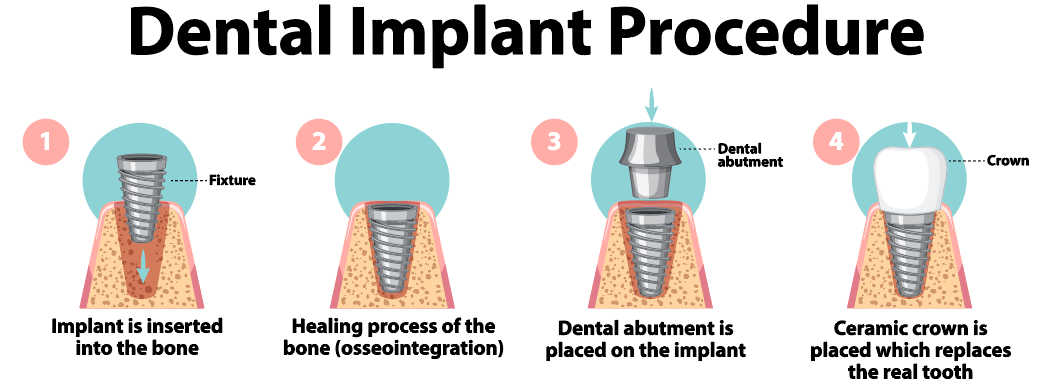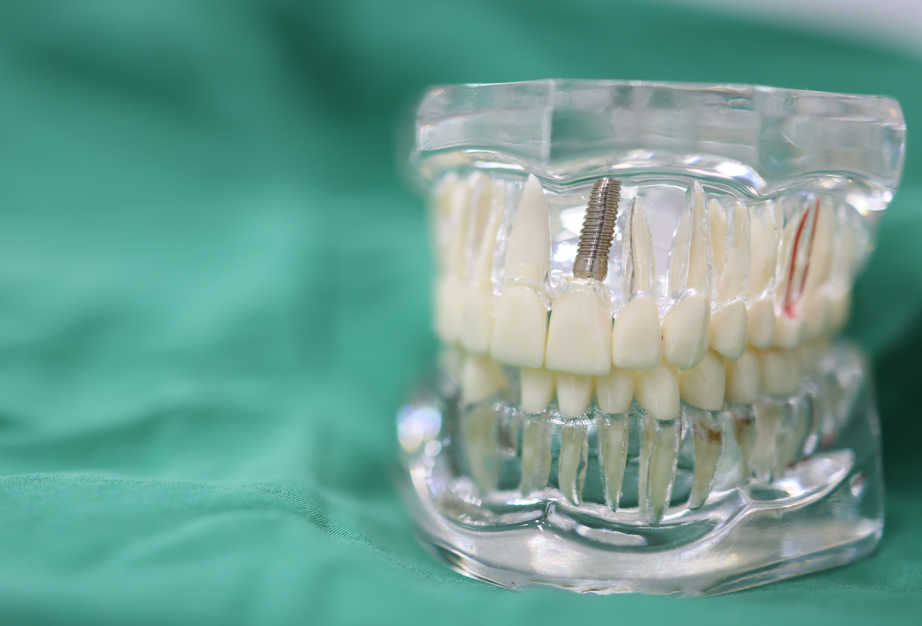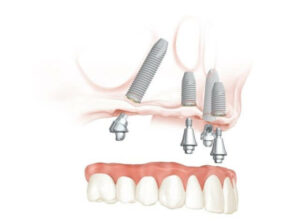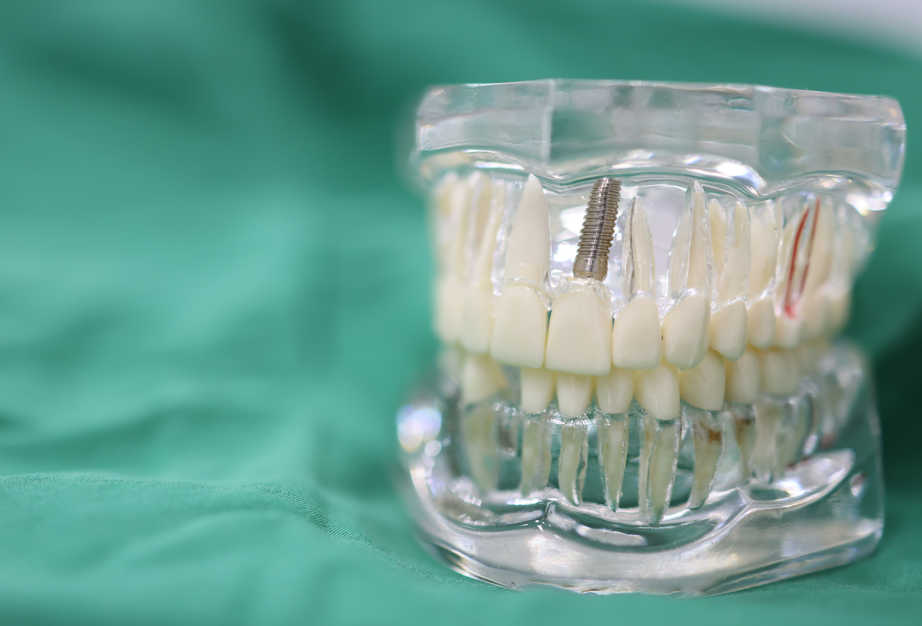Dental Implant FAQ (Frequently Asked Questions)
What are dental Implants?
A Dental implant is a specialist medical device that is implanted in the jaw bone to replace missing teeth.
What are dental implants? A dental implant is an artificial replacement for a tooth root, usually made of titanium, which is inserted into the bone where you have a gap. The top end of the dental implant usually has an internal screw thread, which allows a dental abutment to be screwed in. Once the abutment is placed onto the implant it is ready to support a crown, bridge or a denture depending upon individual circumstances.

Is there any harm in leaving the gap?
Most patient do not realize the importance of having the failing or missing teeth replaced. Although you can decide to live with a gap after a tooth has been extracted, however in most cases, this can lead to some irreversible changes to the anatomy of bone and adjacent teeth.
The presence of teeth helps maintain the shape of jaw bone and keep adjacent and opposing teeth in their position. Following extraction of a tooth the jaw bone starts to receede and depending upon how many teeth are lost can cause changes to the facial appearance.
Secondly, the teeth act as anchors and support for each other and if a tooth is lost it can result in the adjacent teeth tilting in the empty space and opposing teeth moving up or down into the space, hence causing misalignment of remaining teeth and creating unnatural gaps between the remaining teeth which can be difficult to clean and hence starting a vicious circle of further teeth and gum problems.
Are there any alternative options to replace my missing teeth?
Depending on your individual circumstances, there are alternative treatment options available to replace the missing tooth or teeth. These may include a dental bridge, or a removable denture. The specific treatment option will be determined based on factors such as oral health, bone condition, and patient preferences.
Am I a good candidate for a dental implant?
The good news is that most people are suitable to have dental implants. There are no absolute contraindications to have a dental implant. At your initial consultation appointment, the implant dentist will carry out a thorough clinical examination to assess your suitability for the procedure. Along with other assessments, X-rays and 3D bone imaging may be done to help in the planning of your case.

Am I too old to have a dental implant?
There is no upper age limit to have a dental implant. At the consultation appointment the dentist will assess your general and oral health and will give you the advice on the best possible solution in your particular case.
What implant system you use?
We use Megagen and Neodent implants. Megagen implants are made in Korea and is one of the premier and widely used implant systems. Megagen Implants have been awarded the third consecutive certified award from the Clean Implant. Only a few implant companies in the world have been chosen to get this certificate of ‘Trusted Quality’.
The Neodent implant system is made in Brazil and is part of the prestigious Straumann group of implants. Neodent® is a global brand available in more than 60 countries, with more than 1.6 million implants sold annually. With a legacy of more than 25 years focused on ease of use.
How are your prices more competitive as compared to the general UK average implant cost?
We are asked this question very frequently. To keep it short and simple, I have limited my practice to dental implants, this is the only thing I do, day in day out. Hence doing large volume of work helps me to offer the best price to my patients.
How long have you been doing it?
I have been placing and restoring dental implants for over 15 years now. In 2011 I decided to make it go further and got myself working towards a masters qualification in dental implants. Having completed the 3 years programme, I have limited my practice to dental implants only, for the last 8 years.
Does the procedure hurt?
The dental implant procedure is typically performed under local anaesthesia, so you should not feel any pain during the actual procedure. The area around the implant site will be numbed to ensure your comfort. However, in some cases patients can experience mild discomfort after the anaesthesia wears off, like any dental surgery. Your dentist or oral surgeon may prescribe pain medications to manage any post-operative discomfort. It’s important to follow their instructions for proper care and pain management during the recovery period.
It’s important to note that everyone’s pain tolerance and individual experiences may vary. If you have concerns or specific questions about your dental implant procedure, it is best to consult with your implant dentist who can provide you with personalized information based on your unique circumstances.
How long does it take?
The duration of the dental implant procedure can vary depending on several factors, including the complexity of the case and the number of implants being placed. On average, the entire process can take some months to complete from the initial consultation to the provision of final teeth.

Do you do teeth in a day?
The “Teeth in a Day” protocol, also known as “All-on-4” or “Same-day Teeth,” is a dental implant treatment option that allows for the replacement of a single or full arch of teeth (either upper or lower) in one day, thus avoiding the need to wear temporary dentures etc through the healing phase.
The Teeth in a Day protocol offers a more efficient and streamlined approach to dental implant treatment, reducing the overall treatment time compared to traditional implant procedures. However, it’s important to note that the protocol may not be suitable for everyone. Each case is unique, and your implant dentist will evaluate your oral health and determine if you are a candidate for the Teeth in a Day procedure.

How long the implants last?
The lifespan of dental implants can vary depending on various factors. However, with proper care, dental implants can last for many years, even decades.
Is there a chance that my implant might fail?
While dental implants have a high success rate, it is possible for them to fail in some cases. Dental implant failure refers to a situation where the implant does not integrate properly with the surrounding bone or experiences complications that lead to its removal. The failure rate for dental implants is generally low, estimated to be around 2% to 5%.
Your implant dentist will be able to provide you with more personalized information about the chances of success in your particular case based on your unique circumstances.
What would you do in the event of implant failure?
The implant dentist will carefully remove the implant to avoid causing further damage. After the implant removal, the area will undergo a healing period to allow the surrounding tissues to recover. The dentist will assess the reasons for implant failure and evaluate the condition of the surrounding bone and soft tissues. Once the area has healed, the dentist will work with you to develop a new treatment plan.
Do you offer any guarantee?
When assessing your suitability for dental implant treatment, our implant dentist will have open and transparent discussions and will provide information about any guarantees we offer, explain the limitations, and answer any questions you may have. It’s important to remember that guarantees should not be the sole determining factor in choosing a dental professional or implant system, but rather one aspect to consider along with their expertise, reputation, and your individual treatment needs.
Do you offer payment plans?
Yes, please consult the reception for further details.
I have a dental insurance would that cover me for the dental implant treatment?
The coverage for dental implant treatment under dental insurance plans can vary depending on the specific insurance provider and the terms of your policy. Dental insurance plans often have limitations and exclusions regarding coverage for certain procedures, including dental implants. Please check with your individual policy provider for details.
What makes you unique?

Choosing our dental implant practice means patients can expect the highest quality care, advanced technology, personalized treatment, comfort and convenience, and high success rates for their dental implant treatment.




